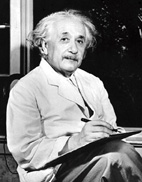A. Einstein Screenplay
This has been our great passion for more than the last decade. I can think of no greater man worthy of an epic picture, than Albert Einstein.
Albert Einstein Screenplay: A Touch of Genius
This movie is a glimpse into the mind of a genius through the remarkable screenplay A. Einstein, based on the book Einstein's Tears, written by a physicist and writer, Joseph 'JP' Prindle. It is dedicated to enthusing young people, and those who influence them, to learn about Einstein, science and physics, while building public awareness about their roles in society.
Most of us know that Albert Einstein was a German-born Jewish theoretical physicist of profound genius, widely regarded as the greatest scientist of the 20th century.
But what do we really know about the man, versus the myth?
Einstein himself was deeply concerned with the social impact of his discoveries. His reverence for all creation, his belief in grandeur, beauty, and sublimity of the universe was his primary source of inspiration in science. And his awe and appreciation for the scheme that is manifested in the material universe - are all expressed and clearly evident throughout his work and philosophy. (Also see Einstein movie scenes).
A. EINSTEIN
by Joseph 'JP' Prindle
SYNOPSIS:
A solitary plane approaches a distant island. The crew of the Enola Gay is preparing to drop the first atomic bomb on Hiroshima, Japan. Half way around the world, ALBERT EINSTEIN, 66, the familiar wild-haired genius, is walking on the Princeton campus, pulling out an old battered compass to guide him.
Sixty years earlier, a young Albert is sick in bed when his uncle JACOB gives him a compass. Sparking a lifelong passion in science, it also becomes a symbol for his guiding humanity. He thinks of it as a little miracle because "something invisible is working on it". Shy and introverted, as a Jew at a Catholic school and a free thinker in Germany, the young Einstein is branded as an outsider. The same attributes that will make him one of the most celebrated scientists in history - independence, curiosity, and an innate suspicion of authority - make his adolescence painful.
After the family business collapses, his parents HERMANN and PAULINE are forced to move, leaving Einstein behind in Germany to finish school. He cannot go to a German university unless he graduates. But the military style school is too much for him, and the unconventional Einstein drops out of school and flees to Italy to be with his family.
In Italy, Einstein feels liberated. While preparing to take a college entrance exam, he falls in love - with physics. At the same time, he renounces his German citizenship and begins a life long journey of a man with no country. But he fails the college entrance exam, and is forced to go to Switzerland to a 'community college'. He is finally accepted to a university, where he is an average student because he focused on only one thing - science. While there he falls madly in love with a fellow student MILEVA MARIC, and has an illegitimate daughter. After graduating, Einstein is now a father, unemployed and flat broke. No University will take him; he is rejected for his PhD, and he is desperate. Finally, he takes a lowly job as a patent clerk, "to feed his belly".
Spurred by the death of his father, he begins studying feverishly. Working in his spare time, at night and on the weekends, Einstein writes three of the most important scientific papers in history - including the theory of relativity. While soon gaining some fame in the very small physics community, Einstein is unknown to the world at large. But when experimental evidence finally confirms his theory, the now 'suddenly famous' Einstein can pursue his lifelong dream, which is to work at a university on his beloved physics. But there is a dark side to his newfound fame.
Confronted by the fact that his work has made an atomic bomb possible, the avowed pacifist is troubled but silent. At the same time, while the Nazi's are marching into power and war, he discovers that Germany is now mining uranium. Reluctantly, he writes the famous letter to Roosevelt that an atomic bomb is possible - and it starts the Manhattan project. With war raging across Europe, the race is on to make the first atomic bomb. Will it be Germany, the country of his birth, or America, the country of his choice?
America wins the arms race, but against his protestations the bomb is dropped - and the world will never be the same.
When the war is finally over, Einstein's commitment to his fellow man does not stop until his death. He works tirelessly on behalf the United Nations, and contributes to formation of a new state of Israel. He publicly speaks out against McCarthyism, and lobbies for a ban of all of nuclear weapons. Einstein remains to the end a scientist, a humanist, and an unrepentant progressive free thinker.
